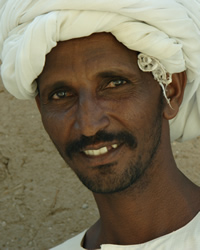Arab, Sudanese in Sudan

Photo Source:
David Haberlah - Wikimedia
Creative Commons
|
Send Joshua Project a map of this people group.
|
| People Name: | Arab, Sudanese |
| Country: | Sudan |
| 10/40 Window: | Yes |
| Population: | 15,948,000 |
| World Population: | 21,820,300 |
| Primary Language: | Arabic, Sudanese |
| Primary Religion: | Islam |
| Christian Adherents: | 0.05 % |
| Evangelicals: | 0.01 % |
| Scripture: | New Testament |
| Ministry Resources: | Yes |
| Jesus Film: | Yes |
| Audio Recordings: | Yes |
| People Cluster: | Arab, Sudan |
| Affinity Bloc: | Arab World |
| Progress Level: |
|
Introduction / History
Sudanese Arabs originated in the Khartoum region of Sudan many centuries ago. Today, they live primarily in northern and central Sudan and in Egypt. A few groups are also scattered in Saudi Arabia, Ethiopia, Libya, Yemen and the United Arab Emirates.
The first "pure" Arabs were called "Bedouins." They were tribal nomads from Saudi Arabia, famous for their love of poetry and war. The Sudanese are a tribe who branched off of the Bedouins. Over the years, many "Arabs" have emerged by either assimilating into Arab culture, religion, and language, or by intermarrying with groups in their areas. The Sudanese Arabs have intermarried with the African tribes of Sudan.
The Sudanese Arabs originated in the Khartoum region of Sudan many centuries ago. Today, they live primarily in northern and central Sudan and in Egypt, though some have migrated to what is now South Sudan. A few groups are also scattered in Saudi Arabia, Ethiopia, Libya, Yemen and the United Arab Emirates.
What Are Their Lives Like?
Most Sudanese Arabs live in small rural villages. They grow grains, vegetables, and cotton, and raise livestock, all of which are used for food or trade. Clusters of mud-brick homes with dirt floors make up the villages. The homes are built close together, which reflects the close ties between the family members within the communities. Although farming is the chief occupation of the villagers, some of them have jobs as skilled carpenters, tailors, religious leaders or barbers.
Some Sudanese Arabs live in towns or cities. They have a greater variety of occupations, but weaker family ties than those who live in villages. These Arabs have more concern for such things as economic prosperity and education.
Other Sudanese Arabs have continued living the nomadic lifestyle of their ancestors. They have temporary dwellings and move from place to place with their herds. Camels are used to transport them across desert lands, and their economy is based primarily on livestock production and trade. Rigid codes of honor, loyalty, hostility and hospitality are among those values that have remained strong throughout the centuries.
In the Arab culture, children are considered to be a family's greatest asset, providing both workers and security for the parents as they grow older. Although boys and girls may be raised together when they are young, they are treated differently. Mothers show great affection towards the boys, pampering them and responding to their every wish. Girls are shown some affection but are not pampered. The boys are taught by their fathers to obey and respect older males. Girls are taught the values of obedience to their future husbands. Teenagers are not permitted to have any contact with the opposite sex until after marriage.
What Are Their Beliefs?
The Sudanese Arabs are Muslims, as are most Arabs. Identification with the Islamic religion is one of the primary cultural characteristics of most Arabs. They are devoted to their faith, and this is evident in their daily life.
While the men gather in the local mosque five times a day for prayer, women meet in homes and have their own religious services, conducted by female religious leaders. Only on certain occasions are the women permitted inside the mosques.
According to Islamic law, a man may have up to four wives. Rules concerning marriage and divorce are held in accordance to what is written in the Koran. Regulations regarding inheritance, taxation, wartime, submission to those in authority, and the roles of family members can also be found there.
What Are Their Needs?
Sudanese Arabs live in a country engulfed by war, terror and destruction. Though Sudanese Arabs are largely responsible for the mayhem, there are innocent women and children who need the Lord's protection.
Prayer Points
Pray for Sudanese Arab family leaders to have dreams of the righteous and victorious Christ, leading entire clans to the cross.
Pray for oral Bibles, gospel recordings, the JESUS Film, etc. to become easily to all Sudanese Arabs.
Ask God to bring natural and spiritual peace to this needy country in the name of Jesus.
Pray that God will raise up long term workers who love the Lord more than their own lives.
Pray that the Holy Spirit will complete the work begun in their hearts through adequate discipleship.